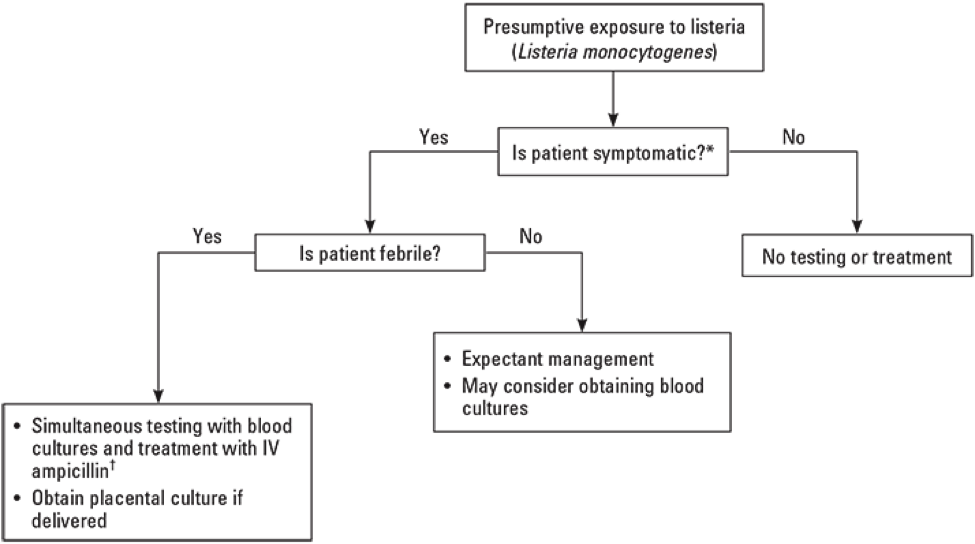Clinical Scenario:
A 28-year-old G0P0, last menstrual period November 2, presents with amenorrhea. Urine pregnancy test is positive. Examination is normal. Bedside ultrasound demonstrates an early intrauterine pregnancy.
After being given follow-up information and return precautions she asks for advice in order to have a healthy pregnancy. What do you tell her?
Foods to avoid
- Soft cheeses made from unpasteurized milk (brie, feta, queso blanco/fresco)
- High mercury fish/seafood (swordfish, mackerel, snapper, shark, albacore tuna)
- Cold cuts, deli meat/poultry, hot dogs, refrigerated smoked fish must be heated to 165˚F (steaming)
- Raw eggs (cookie dough) or fish (sushi)
- Raw or undercooked sprouts
- Unpasteurized milk/milk products or juices
- Caffeine – limit consumption to 200mg caffeine/day equivalent of 1 cup
Why?
- These foods may harbor food born illness such as Listeria, Salmonella, E. coli, parasites, or bacteria.
- Fish may contain high levels of mercury; of these high mercury fish 1 serving a week may be consumed.
- Excessive caffeine has been linked to miscarriage, preterm birth, or small for gestational age.
Briefly about Listeria in Pregnancy1
Incidence
- 1,600 people per year, 260 die
- Incidence in pregnancy is 13 times that of general population
- Most likely to affect: Pregnant women, newborns, adults >65 y, and those with weakened immune systems
- 1 in 5 pregnancies complicated by listeriosis result in spontaneous abortion or stillbirth
Symptoms/Presentation
- Non-specific flu-like illness: fever, myalgia, headache, diarrhea, GI symptoms
- Fetal or neonatal infections can be severe resulting in fetal loss, preterm labor, neonatal sepsis, meningitis, death
Management algorithm

How about exercise or physical activity precautions?
Most national guidelines recommend moderate exercise in pregnancy. Studies indicate mild to moderate exercise does not increase the risk of miscarriage (however high impact exercise can be associated with increased risk) or preterm labor.2,3
Furthermore, a Cochrane review of two studies comparing bed rest versus no bed rest showed no decrease in miscarriage.4 In the case of threatened abortion or recurrent pregnancy loss, many physicians recommend no vaginal intercourse. However, there is no data to support this recommendation. Theories exist regarding stimulation causing uterine contractions or uterine colonization of bacteria but again none of this has been shown to decrease the rate of miscarriage.4 Despite the lack of data, in the setting of threatened abortion, physicians typically recommend avoiding vigorous activity, heavy lifting, and sexual intercourse.
Take Away Points
- Food restrictions
- Do not eat soft cheeses (queso blanco, brie)
- Do not eat raw/undercooked food
- No cold cuts unless heated to steaming
- Limit consumption of certain fish
- Limit 1 cup of coffee/day
- Listeriosis can be devastating in pregnancy resulting in spontaneous abortion or pregnancy loss
- Mild to moderate exercise in pregnancy is likely safe
- Although there is limited evidence in “physical activity precautions” in certain circumstances physicians may recommend avoiding vigorous activity, heavy lifting, and sexual intercourse.
Resources (Accessed 12/19/16)
- American Congress of Obstetricians and Gynecologists – Patient education page
- http://www.acog.org/Patients
- Lots of information sheets about nutrition, exercise, etc
- FoodSafety.gov has a Checklist of Foods to avoid in Pregnancy
- https://www.foodsafety.gov/risk/pregnant/chklist_pregnancy.html
- Great table on foods to avoid in pregnancy or how to safely consume these foods.
- Food and Drug Administration – Food Safety for Pregnant Women
- http://www.fda.gov/downloads/Food/FoodborneIllnessContaminants/UCM312787.pdf
- 26 page booklet on food borne illnesses and proper food handling/preparation
- American Pregnancy Association – Listeria and Pregnancy
- http://americanpregnancy.org/pregnancy-complications/listeria/
- Information on listeria, foods to avoid, safe food handling
References
- Management of pregnant women with presumptive exposure to Listeria monocytogenes. Committee Opinion No. 614. American College of Obstetricians and Gynecologists. Obstet Gynecol 2014;124:1241–4. (http://www.acog.org/Resources-And-Publications/Committee-Opinions/Committee-on-Obstetric-Practice/Management-of-Pregnant-Women-With-Presumptive-Exposure-to-Listeria-monocytogenes)
- Hegaard HK, et al. Exercise in Pregnancy: First Trimester Risks. Clin Obstet Gynecol. 2016; 59(3): 559-67.
- Di Mascio D, et al. Exercise during pregnancy in normal-weight women and risk of preterm birth: a systematic review and meta-analysis of randomized controlled trials. Am J Obstet Gynecol.2016 Nov;215(5):561-571.
- Aleman A, et al. Bed rest during pregnancy for preventing miscarriage. Cochrane Database Syst Rev. 2005;18(2):CD003576
- Tien JC, Tan TY. Non-surgical interventions for threatened and recurrent miscarriages. Singapore Med J. 2007;48(12):1074-90.
